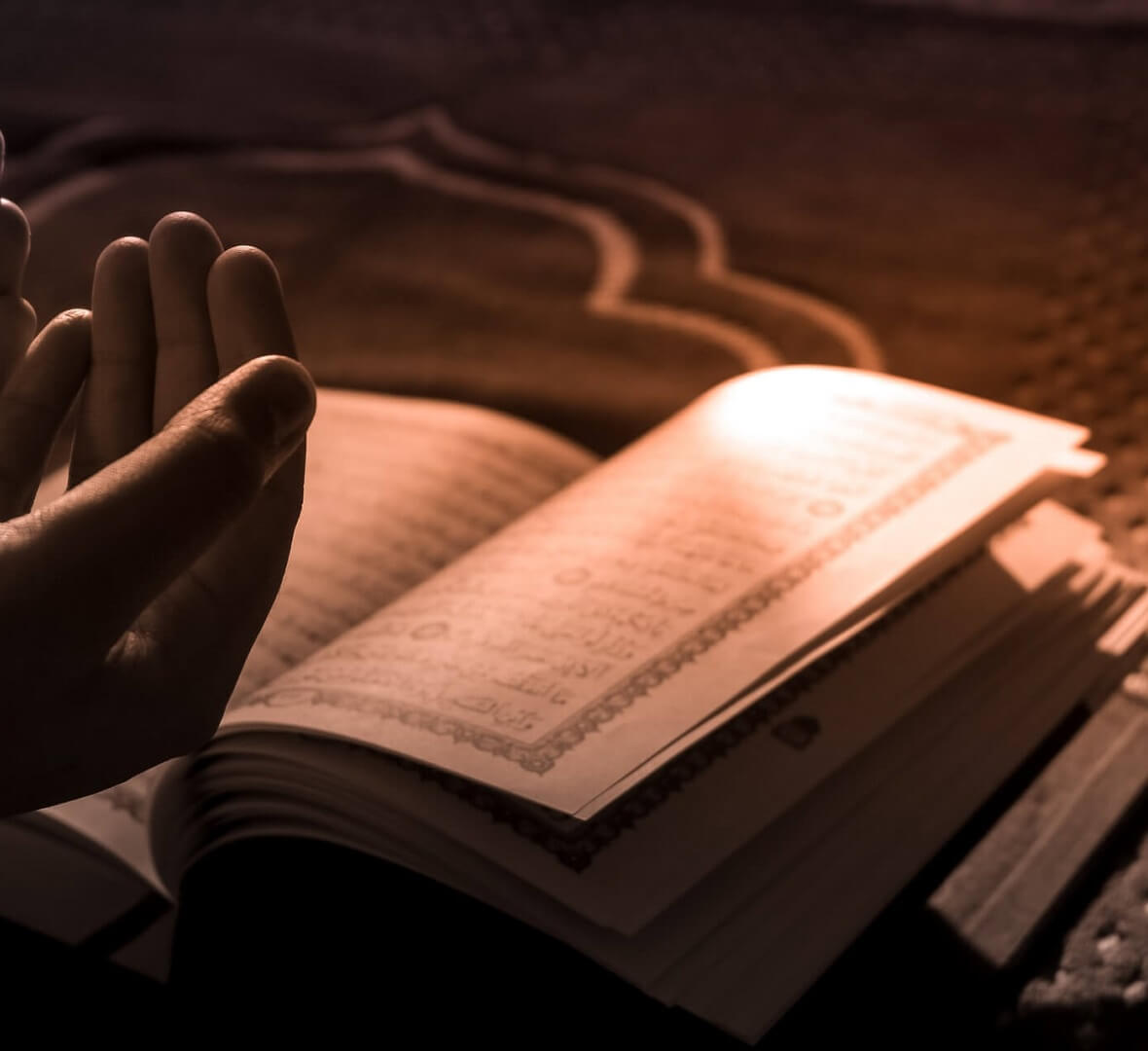In Ikhlas and its connection to the heart, the concept of Ikhlas from an Islamic perspective was discussed. To have sincere intention is to dedicate our actions to Allah SWT, in order to seek His pleasure. It was established that sincere intentions are located in one’s heart. When one’s heart and intention are beautifully aligned then the outcome is Allah SWT’s pleasure and acceptance of one’s deeds.
A hadith regarding intentions mentioned in Sahih Bukhari and in Sahih Muslim was quoted.
Umar ibn al-Khattab reported: The Messenger of Allah, peace and blessings be upon him, said, “Verily, deeds are only with intentions and every person will have only what they intended. Whoever emigrated to Allah and His Messenger, his emigration is for Allah and His Messenger. Whoever emigrated to get something in the world or to marry a woman, his emigration is for that to which he emigrated.” (Sahīh al-Bukhārī 54, Sahīh Muslim 1907).
The importance of this hadith has been recorded by a plethora of scholars. The “actions are by intentions” hadith constitutes “a third of all knowledge” and falls within 70 chapters of fiqh. states Imam Ash-Shafi’i (rahimahulla) and is an important foundation of Islam (See The Hadith of Intention, by Ibn Rajab Al-Hanbali-sunnahonline.com).
This means that the value, experience, excellence, consequences, and acceptance of every single deed are dependent on intention. The hadith is, therefore, a holistic one that encompasses every aspect of the deed in question. SubhanAllah!! Without the right intention, our deeds can be completely rejected by Allah SWT. Then what are we amassing for our akhirah?
In this article, we will take a closer look at the importance of acting upon Ikhlas, what destroys Ikhlas and how we might strengthen it in our hearts.
Benefits of Acting Upon Ikhlas
Intentions are the soul of our actions. As believers, we must remember that If we want to truly worship Allah SWT and draw near to righteousness then, we must reconcile our good deeds with our intentions for any benefit from them in the akhirah.
In Islam, without intentions, actions are unsatisfactory. Deficient even. And without pure intentions, our acts become boastful or hypocritical.
Depending on your intentions, your deeds will either benefit you in the Duniya or in the akhirah. For those who toil for the purpose of this life, Allah SWT says in Surah Al-Furqan:
وَقَدِمْنَا إِلَىٰ مَا عَمِلُوا مِنْ عَمَلٍ فَجَعَلْنَاهُ هَبَاءً مَنْثُورًا
“And We shall turn to whatever deeds they (disbelievers, polytheists, sinners, etc.) did, and We shall make such deeds as scattered floating particles of dust” (25:23).
Meaning that it will amount to nothing in the akhirah.
➔ Acceptance of deeds by Allah
The important hadith narrated earlier shows that deeds will be rewarded based on intentions and everyone will be rewarded for what he intended. The ascetic Fudayl bin ‘Iyyad has said regarding deeds, that it is the most sincere of it and the most correct of them that will be accepted by Allah SWT. The sincere deed is the deed done for the sake of Allah SWT (intention) and the right one is that which conforms with the acts of Sunnah (I’lām al-Muwaqqi’īn 3/124).
Therefore, Acceptance of deeds by Allah SWT is clearly dependent upon the purity of intention.
➔ Magnification of a deed and multiplication of the reward
A seemingly insignificant good deed can have its reward multiplied because it had a sincere intention. Ikhlas adds weight and volume to a deed.
“Many a simple good deed is multiplied by the intention and many a great deed is made insignificant by the intention” (in Ash-Shareef 2020: 60).
Just imagine! Our amal may all be going to waste because of the lack of ikhlas! Even an apparent good deed, like helping an orphan over years, may have no reward in the akhirah because it was not accompanied by ikhlas.
For example, if it was performed for the sake of the orphan or for the sake of goodness and not for the sake of Allah SWT, you are either placing the importance on the orphan over Allah SWT or doing a deed for a mere worldly benefit.
However, giving a thirsty person a glass of water might weigh heavy on the scale on the day of judgment because it was done with the hope of seeking Allah SWT’s pleasure. Such regular permissible deeds can even be elevated to a status of worship because of ikhlas.
➔ Purification of the heart
The heart is fickle and turns over and over. But with sincerity, the heart can be purified and turned to Allah SWT again. Scholars have noted that with sincerity, diseases of the heart such as malice, envy, and anger can be eradicated and wisdom received.
➔ Gaining Allah’s pleasure
A deed performed with sincerity will gain Allah SWT’s pleasure and help. To the extent that, Allah SWT’s company will suffice that person.
➔ Achieving Jannah
Jannah is our final goal, for all that we toil on this earth. Sincere intentions have the potential to absolve us from hellfire and open the gates of Jannah for us. The more we pursue sincerity, the more we are guaranteed steadfastness or continuity of righteous deeds and the greater likelihood of Jannah.
The Destroyers of Ikhlas
If sincerity is the absence of Nifaq (hypocrisy), Shirk (Idolatry), and Riya (Show off), as mentioned in the previous article, then these would also be the primary destroyers of Ikhlas. So let us elaborate on these conditions of the heart.
1. Nifaq
Allah SWT calls the hypocrites ‘alladeena fi kulubuhum mardhun’ – those with sickness in their hearts (Surah Al-Ahzaab 33:12). Referring to the hypocrites who were fighting alongside the Prophet ﷺ and the believers in the battle of Ahzaab, Allah SWT exposes them as two-faced, double-tongued deceivers. Regarding hypocrites, Al-Hasan Al-Basri (may Allah SWT have mercy on him) has stated:
“Hypocrisy is of two types: the hypocrisy of action and the hypocrisy of rejection (or belief).”
The hypocrisy of rejection is rejection in the heart primarily of the word of Allah SWT and Muhammad ﷺ being the messenger of Allah SWT.
With regard to actions, Ibn Jurayj said of the hypocrite,
“His actual deeds are different from what he publicizes, what he conceals is different from what he utters, his entrance and presence are not the same as his exit and absence.”
According to Hadith Narrated ‘Abdullah bin ‘Amr:
The Prophet ﷺ said, “Whoever has the following four (characteristics) will be a pure hypocrite and whoever has one of the following four characteristics will have one characteristic of hypocrisy unless and until he gives it up.
➔ Whenever he is entrusted, he betrays.
➔ Whenever he speaks, he tells a lie.
➔ Whenever he makes a covenant, he proves treacherous.
➔ Whenever he quarrels, he behaves in a very imprudent, evil, and insulting manner.”
(Sahih Bukhari, Hadith 27)
(Bukhari H: 34, Muslim H: [210] 106 – (58), Tirmidhi H: 2632, Abu Dawud H: 4688 & Nasa’I H: 5023)
Nifaq is the antithesis of ikhlas. The more one abstains from nifaq the greater the ikhlas and vice versa.
There is no Jannah for the hypocrites, so let us all be cautious and ensure that our intentions align with our actions.
إِنَّ الْمُنَافِقِينَ فِي الدَّرْكِ الأَسْفَلِ مِنَ النَّارِ وَلَن تَجِدَ لَهُمْ نَصِيرًا
Surely the hypocrites will be in the lowest depths of the Fire—and you will never find for them any helper— (Surah An-Nisa 4:145)
2. Shirk
Being a Muslim is one of the preconditions for our deeds to be accepted. Shirk is idolatry; to worship something besides Allah SWT or to claim partnership with Allah SWT. It is the greatest form of Zulm (wrongdoing). Kamaluddin states that for the kuffar, whatever good deeds they do will have their rewards met in this world, but will count for nothing with Allah SWT in the Hereafter.
“This is because they failed to recognize Him in the manner that He commanded” (Faith In Perspective 2020: 112)
It is a matter of intention because, for a disbeliever, deeds are never performed seeking Allah SWT’s pleasure or mercy, but rather for worldly gain. However, Muslims are not exempt from shirk either!! Shirk has many manifestations. Idolatry is not merely the worship of other idols or gods; it is also giving importance to anything or anyone beyond or alongside Allah SWT. It is a form of ‘zulm’ -mixing one’s faith with wrong- ‘Yalbisu eemaanuhum bi zulmin’ (Surah Al-An’am 6:82).
الَّذِينَ آمَنُواْ وَلَمْ يَلْبِسُواْ إِيمَانَهُم بِظُلْمٍ أُوْلَئِكَ لَهُمُ الأَمْنُ وَهُم مُّهْتَدُونَ
They who believe and do not mix their belief with injustice – those will have security, and they are [rightly] guided (6:82)
The Tafseer of this verse according to Maarif Ul-Quran:
“…the verse comes to mean that a person who mixes some sort of Shirk in his or her eeman, that is, one who, despite believing in Allah Ta` ala along with all His attributes of perfection, takes non-Allah too as bearing some of those attributes, shall be considered excluded from the guarantee of peace and faith given here.” (Maarif-Ul Quran).
In a lecture series by Nouman Ali Khan, he states regarding this verse that any kind of obsession that goes beyond our commitment to Allah SWT could be ‘zulm’.
Mixing up intentions could also manifest itself in other ways. To do a good deed for the sake of Allah SWT and also for some other purpose, would again invalidate ikhlas and the significance of the deed.
3. Riya
Known as ostentation, Riya is a form of shirk. It is to perform an act of worship with the intention of achieving praise by others, fame, or worldly benefit. Such as seeking followers on social media or beautifying ourselves to draw attention. The primary intention is not to receive Allah’s reward or blessing. It is a minor shirk but Rasoolullah ﷺ has stated
“what I fear most (that will befall my ummah) is minor shirk…..minor shirk is Riya” (Musnad Ahmad 23630)
Riya nullifies the deed we boast about. It is particularly harmful when it concerns our obligatory deeds such as prayer, fasting, and zakat. And if Riya is continuous, it will surely invalidate nearly all of our deeds.
4. Ujub and Takabbur
Also forms of minor shirk. Ujub and Takabbur both are concerning pride in their own achievements. They are a form of arrogance. Takabbur is to openly claim your greatness, while Ujub is to think it in your heart. Some scholars note that this feeling of superiority could lead one to believe that their achievements were out of their own effort rather than through Allah SWT’s favor. In performing deeds, isn’t it true that at times we perform them as it generates a sense of pride in ourselves? This, however, should not be confused with feeling joyful in having performed a good deed for Allah’s pleasure. It is so important to be in control of our intentions at all times!
Strengthening Ikhlas
Here are some ways to strengthen ikhlas and this list is not exhaustive.
Dhikr
The more we remember Allah SWT and contemplate His greatness, the less likely we are to give importance to anyone or anything else. It is indeed a magnificent tool to overcome the diseases of the heart and to establish Tawheed.
“those who believe and whose hearts find comfort in the remembrance of Allah. Surely in the remembrance of Allah do hearts find comfort.” (Surah Al-Ra’d- 13:28)
Dhikr is the act of repeated remembrance of Allah SWT and the most effective of dhikr is that which is consistently done.
Oh Believers! Remember Allah abundantly, and glorify Him in the morning and evening. (Surah Al Ahzaab-33:41-42)
The Prophet SAW recommended supplications for mornings and evenings. These have been compiled in numerous books. Allocate a time, after Fajr and Maghrib, to recite them.
Shukr- Gratitude
Gratitude is important for the sole purpose of recognizing that everything ultimately comes from Allah SWT. Nothing we do or achieve is within our control to be able to take any credit for it. Riya, for example, cannot be present when we accept that a good deed happened only because Allah SWT allowed it to happen. Gratitude to Him also removes hypocrisy and shirk because we acknowledge that Allah SWT is the sole receiver of our thanks and praise.
Vigilance
To be forever on guard. Every time an act is performed, ensure that you are doing it with the right intentions. And ensure, the intention that was right is protected after the act is performed so that the deed is not nullified later. It is a great feat. This calls for consciousness in every action performed, bringing the intention to the surface. It is harder to be watchful than to actually perform the deed. But to ensure the sincerity of intentions we must ensure the intention is protected at all times. For example, giving charity and then talking about it would invalidate the original intention to do it for the sake of Allah SWT. Sincerity is one of the hardest things to achieve and for this reason, the pious predecessors used to beseech Allah SWT for sincerity.
Muraqabah or Divine Mindfulness is a struggle to remain vigilant that Allah SWT is forever watchful over our hearts. As Muraqabah develops, so does our awareness of Allah SWT’s majesty, and our dependence on the praise of others diminishes.
… And Allah is watchful over all things. (33:52)
Honesty and humility
Being honest with oneself is critical as sincerity is not perfected except with honesty. Honesty is to have a complete awareness of the nature of one’s intentions. Insincere intentions cannot be identified without honesty. Humility is to be able to acknowledge and accept when an intention is insincere and to be willing to rectify it.
Duas
Some beneficial Duas to achieve ikhlas and help align our hearts with our intentions and actions are listed below. Just as much as we take action to avoid insincerity, it is also critical to seek Allah SWT’s assistance in the form of supplications to receive help in the matter. For it is only Allah SWT who can guide us to righteousness.
a)
رَبَّنَا لاَ تُزِغْ قُلُوبَنَا بَعْدَ إِذْ هَدَيْتَنَا وَهَبْ لَنَا مِن لَّدُنكَ رَحْمَةً إِنَّكَ أَنتَ الْوَهَّابُ
Rabbana la tuzigh quloobana ba’da idh hadaitana wa hab lana milladunka rahmah innaka antal Wahhab
“Our Lord, let not our hearts deviate after You have guided us and grant us from Yourself mercy. Indeed, You are the Bestower.” (Surah Ala Imran:8)
b)
اللهم طهر قلبي من النفاق
و عملي من الرياء و لساني من الكذب
و عيني من الخيانة
فانك تعلم خائنة الأعين و ما تخفي الصدور
Allahumma tahhir qalbi min an-nifaq,
wa ‘amali min ar-riya’, wa lisani min al-kadhib,
wa ‘ayni min al-khiyana.
Fa innaka ta‘lamu khainata’l a‘yun, wa ma tukhfis-sudur
O Allah! Purify my heart of hypocrisy, and my deeds from showing off, and my tongue from lying, and my eyes from treachery (looking at the forbidden). For indeed, You know the treachery of the eyes, and what lays hidden (deep in the breast) – Baihiqi
c)
وَقُل رَّبِّ أَدْخِلْنِي مُدْخَلَ صِدْقٍ وَأَخْرِجْنِي مُخْرَجَ صِدْقٍ وَاجْعَل لِّي مِن لَّدُنكَ سُلْطَانًا نَّصِيرًا
“And say, “My Lord, cause me to enter a truthful entrance and to exit a truthful exit and grant me from Yourself a supporting authority.” (Surah Al Isra 17:80)
This dua from the Qur’an has been interpreted in many ways. From those scholars citing this as an example of sincerity in actions, Dr. Mohammed Al-Nabulsi says that the dua asks for not only a sincere entrance into a particular deed, but subsequently also asks for a sincere end. That is, the deed should be sincere from beginning to end without any corruption of intention along the way.
d)
اللهُمَّ إِنِّي أَعُوذُ بِكَ مِنْ عِلْمٍ لَا يَنْفَعُ، وَمِنْ قَلْبٍ لَا يَخْشَعُ، وَمِنْ نَفْسٍ لَا تَشْبَعُ، وَمِنْ دَعْوَةٍ لَا يُسْتَجَابُ لَهَا
Allahumma inni a’udhu bika min ‘ilmil la yanfa’ wa min qalbin la yakhsha’ wa min nafsil la tashba’ wa min da’watil la yustajabu laha
‘O Allah, I seek refuge from knowledge which does not benefit, from the heart that is not submissive to you/fearful of you, from the soul that does not feel contented and the supplication that is not answered’ – [Sahih Muslim, Hadith: 2722]
All these various Duas, from requesting Allah SWT for a heart fixed upon the deen, refuge from hypocrisy and Riya, sincerity in deeds from beginning to completion and finally, a contented heart and soul should, In Sha Allah, help guide our intentions in the right direction and help us achieve Allah’s pleasure and much rewards in the akhirah.
Other References:
https://www.al-islam.org/understanding-quran-part-1-murtadha-mutahhari/part-3-quranic-view-heart
https://www.techofheart.com/2015/04/sufi-stations-of-heart-by-al-hakim-al-tirmidhi.html
https://understandquran.com/why-is-the-heart-so-important-in-islam/
https://fiqh.islamonline.net/en/conditions-for-accepting-good-deeds/



